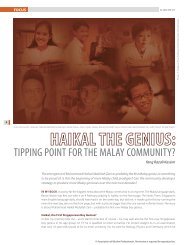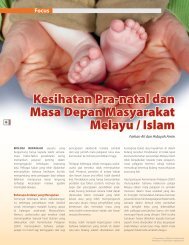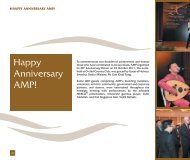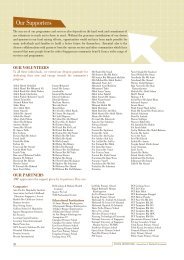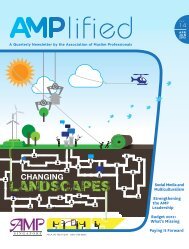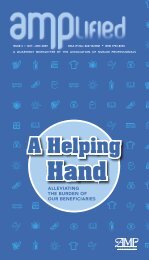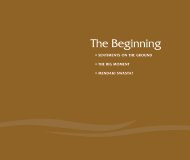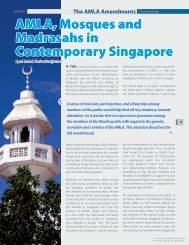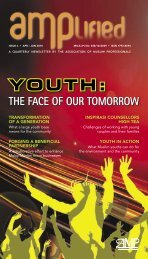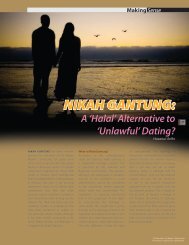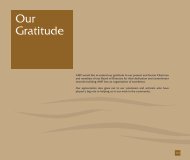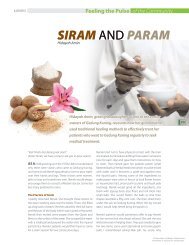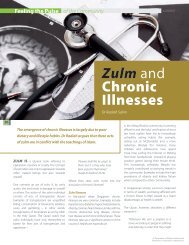The AMLA Amendments - Association of Muslim Professionals
The AMLA Amendments - Association of Muslim Professionals
The AMLA Amendments - Association of Muslim Professionals
Create successful ePaper yourself
Turn your PDF publications into a flip-book with our unique Google optimized e-Paper software.
Cover Story<br />
KARYAWAN<br />
‘In sum, there are potential future<br />
problems that the community<br />
may have to deal with. Rather<br />
than wait for the problems to<br />
grow, they should be pre-empted<br />
with new strategies.’<br />
8<br />
To illustrate: Many <strong>Muslim</strong> Singaporeans have become<br />
property-owning. This is a direct result <strong>of</strong> the government’s<br />
policy <strong>of</strong> encouraging citizens to buy flats and sink their<br />
roots. <strong>The</strong>y also have savings in the Central Provident<br />
Fund. In other words, they have assets which will be<br />
governed by Islamic inheritance law should they die<br />
intestate. Yet, many <strong>Muslim</strong>s have the misguided notion<br />
that the Islamic inheritance law or Faraid only applies to<br />
them as beneficiaries. Faraid however also carries with it<br />
the responsibilities <strong>of</strong> the beneficiaries to the family <strong>of</strong> the<br />
deceased.<br />
Ms Arfat highlights three issues that the community needs<br />
to address. <strong>The</strong> first is to finetune <strong>AMLA</strong> to ride on the<br />
growing trend <strong>of</strong> Middle East funds moving to Singapore;<br />
there is a need to make it easier for these Middle East funds<br />
to set up base here without coming into conflict with<br />
<strong>AMLA</strong>. <strong>The</strong> second is to educate the <strong>Muslim</strong> community<br />
on the importance <strong>of</strong> estate and financial planning, given<br />
the growing assets that families have. <strong>The</strong> third is to<br />
accommodate the role <strong>of</strong> <strong>Muslim</strong> women as administrators<br />
<strong>of</strong> estate, without transgressing the religious principles <strong>of</strong><br />
Faraid (see pg 14).<br />
<strong>The</strong> Family Institution and Financial Planning<br />
Echoing her view, Sadali Rasban, an advisor on Islamic financial<br />
planning, touched on the need to educate the community<br />
on the various elements <strong>of</strong> Islamic inheritance. One key area<br />
requiring review is the need for a ruling on joint tenancy.<br />
Currently joint tenancy is allowed under civil law. A wife<br />
who survives her husband can inherit the whole house<br />
or flat if the couple has joint tenancy. But under Faraid, as<br />
presently applied, the <strong>Muslim</strong> wife will get only half and not<br />
full ownership <strong>of</strong> the property. This is because the other half<br />
has to go to the estate <strong>of</strong> the husband. As a result, many<br />
housewives are under pressure to sell <strong>of</strong>f their property to<br />
conform to Faraid. <strong>The</strong> disposal <strong>of</strong> the property could lead to<br />
other social repercussions. “So here, there is a need to look at<br />
the Fatwa on joint tenancy and see how we can harmonise<br />
it with the joint tenancy contract,” says Mr. Sadali.<br />
<strong>The</strong> significance <strong>of</strong> this issue is seen when we consider that<br />
many <strong>Muslim</strong> families now own flats or properties. <strong>The</strong>re<br />
will come a time when many <strong>of</strong> them will be forced to sell<br />
<strong>of</strong>f their houses in the event <strong>of</strong> the death <strong>of</strong> the head <strong>of</strong> the<br />
family. <strong>The</strong> recourse to dispose <strong>of</strong>f the property in order to<br />
conform to Faraid may also lead to family disputes should<br />
misunderstandings occur. <strong>The</strong> net effect could be disputes<br />
amongst siblings, even the break-up <strong>of</strong> families. Over time,<br />
one can imagine a scenario when the social problems <strong>of</strong><br />
the community get compounded. This certainly is not the<br />
intention <strong>of</strong> Faraid or the Fatwa.<br />
In sum, there are potential future problems that the<br />
community may have to deal with. In fact, the seeds <strong>of</strong><br />
such problems are already being seen by practitioners<br />
in the industry. Rather than wait for the problems to<br />
grow, they should be pre-empted with new strategies<br />
to nip such problems in the bud. <strong>The</strong>se can begin with a<br />
comprehensive and strategic review <strong>of</strong> <strong>AMLA</strong>.<br />
In his parliamentary address when moving the second<br />
reading <strong>of</strong> the <strong>AMLA</strong> amendment Bill, the Minister-incharge<br />
<strong>of</strong> <strong>Muslim</strong> Affairs Dr Yaacob Ibrahim said at the core<br />
<strong>of</strong> the latest amendments was the goal to uplift the <strong>Muslim</strong><br />
community. <strong>The</strong> amendments would strengthen our key<br />
institutions, such as MUIS and the Syariah Court – and <strong>of</strong><br />
course the institution <strong>of</strong> the family.<br />
<strong>The</strong> amendments, he said, would build the hardware and<br />
s<strong>of</strong>tware <strong>of</strong> the community and benefit future generations.<br />
<strong>The</strong> motivation and spirit <strong>of</strong> the government is correct. In<br />
line with that spirit, the time may have come for <strong>AMLA</strong> to<br />
anticipate the future.<br />
Yang Razali Kassim is the Supervising Editor <strong>of</strong> Karyawan<br />
and former Chairman <strong>of</strong> AMP.



